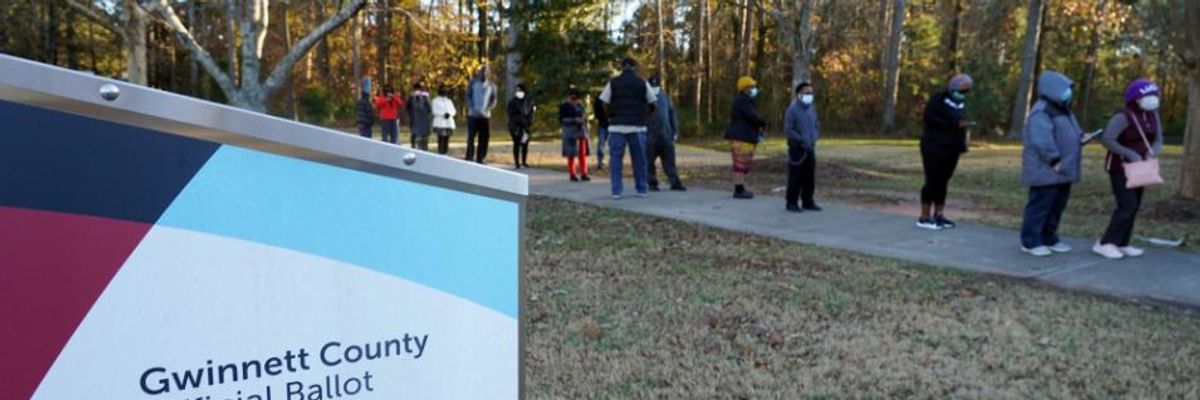Civil rights advocates and political observers are warning that while President Donald Trump has failed to introduce any successful challenges to the presidential election, which he decisively lost to President-elect Joe Biden on November 3, he and other Republicans have likely succeeded in laying the groundwork for a significant rollback of voting rights, particularly targeting communities where disenfranchisement is already rampant.
Trump and the Republican Party have now had more than 50 lawsuits dismissed by federal and state courts, and the Electoral College last week officially affirmed Biden's victory while the federal government's top cybersecurity official--a Trump appointee--called the election "the most secure in American history."
According to a Northeastern University survey, nearly 40% of GOP voters in states that flipped from Trump in 2016 to Biden in 2020 believe the president actually did not lose. And Republican officials are capitalizing on those beliefs and Trump's false claims of fraud to undermine efforts designed to expand voter access.
The doubt and distrust sowed by the president and dozens of Republican lawmakers over the last six weeks has now allowed Wisconsin Republicans to argue that events in public parks where absentee ballots were collected were unlawful, and that Democratic and nonpartisan attempts in the state to make it easier for residents to vote during the coronavirus pandemic "overstepped state law," according to Reuters.
Republicans, who control the Wisconsin state legislature, are expected to consider legislation to curtail in-person early voting, which has been permitted in previous elections.
In Georgia, where voting rights advocates and progressive grassroots groups worked tirelessly to register young voters and people of color--two years after a gubernatorial election in which Republican Gov. Brian Kemp narrowly won after overseeing the closure of dozens of polling locations--state GOP lawmakers said earlier this month that they would seek to end "no excuse" voting-by-mail, which the GOP itself introduced in 2005.
Party officials said doing away with the system would "secure our election process," despite several clear statements from Republican Secretary of State Brad Raffensperger that there was no evidence of election fraud or irregularities in Georgia.
"This appears to be laying the groundwork for what may be a more massive and coordinated voter suppression effort in the new year," Kristen Clarke, president of the Lawyers Committee for Civil Rights Under Law, toldReuters on Monday. "It is a brazen attempt to undermine and obstruct the progress that has been made in 2020 to make it easier for people to vote amid the pandemic."
The Brennan Center for Justice found that 29 states and the District of Columbia changed voting procedures this year to expand voting access, easing rules for voting by mail or by absentee ballot and expanding early voting so people could vote safely. The new rules made it possible for a record 158 million people to cast ballots amid the coronavirus pandemic, despite significant efforts by Trump and other Republicans to cal into questionl the validity of voting by mail and the use of drop boxes.
As Common Dreams reported, Trump ally Sen. Lindsey Graham (R-S.C.) admitted shortly after the election that Republican efforts to place strict controls on mail-in voting are aimed at hurting Democrats' electoral chances.
"If we don't do something about voting by mail, we're going to lose the ability to elect a Republican in this country," Graham told Fox News last month.
As lawsuits brought by Trump and the Republican Party repeatedly failed in the courts over the past month, Paul Blumenthal wrote at HuffPost that the claims being pushed by the president "could be used in years to come to justify unnecessary and damaging voting restrictions that would disproportionately affect Black voters."
"Just because this is all incredibly dumb and has no chance of successfully overturning Biden's win doesn't mean it's not incredibly dangerous," wrote Blumenthal. "The entire scheme involves the delegitimization and disenfranchisement of voters in predominantly Black municipalities. It undermines his supporters' faith in democracy."
While election law expert and former Justice Department attorney Justin Levitt toldNBC News earlier this month that Trump's claims of fraud were unlikely to lead "to a different result in January... I am really afraid about what Donald Trump is currently doing to the country for February and beyond."

